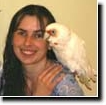Avoiding Illness & Bacterial Issues
in the Aviary
Kristen Reeves, Meadowlark Farms Avian Supply, Inc.
In response to questions I receive about chicks and susceptibility to E.coli (and other bacterial infections) -
Q. How did the chicks or the parents get E.coli? How can I prevent it or reduce the chances from this occurring in my birds? Where did it come from? What will you do to treat them?
A. It's not always easy to explain because even in a clean environment problems may still occasionally occur!
In the case of the birds that began this discussion, the jury is still out (see the ladygouldian.com Facebook page for full discussion). The cage is clean, the parents were chosen carefully before pairing and scanned for potential issues - I go above and beyond here. I scope droppings and take cultures (if I determine there is a need), and pour over my breeding records for months before actually pairing the birds to avoid pitfalls AND correct weaknesses or faults, obviously not something everyone can do! But I know they were fed a good diet, and were groomed for breeding.
However, even with our exceptional care we’ve had MANY issues in the aviary this year that may have contributed to lowered immune systems in the parents, which can then be passed on to the chicks. Power outages, pipe freezes, floods. So while the birds didn’t show any signs of illness or weakness when I began breeding them, they may have been still recovering from those stresses. Not a single bird from this cage acts sick, but the evidence is there showing that I must act or illness WILL rear its ugly head. But the real point here is there isn’t really anything above and beyond good animal husbandry & stewardship practices that allow you to avoid all illness in your flock. It’s a part of keeping birds, so we just need to stay vigilant!
E.coli is a naturally occurring bacterium -
Like humans, our birds all carry E.coli in and on their bodies in manageable amounts. There isn't anything you can do about that! It's part of nature. But just like in humans, when it gets out of control it causes problems. We humans may get diarrhea and sometimes vomiting if the case is severe. If left untreated, E.coli can cause other health issues, typically affecting the internal organs. But because humans have a much more complex immune systems, our bodies are better able to ward off bad bacteria, effectively avoiding most of those problems.
What do WE do to prevent illness? We eat healthy foods, drink lots of water, get plenty of exercise, wash our hands after using the bathroom, keep our surfaces clean, and wash our food before we eat it. For those of us more susceptible to “bugs”, we are more cautious and may take vitamins or supplements to help improve our immune systems. So what about the birds???
Q. How do we prevent illness? It's pretty much the same for the birds as it is for humans -
A. To prevent illness (of just about any kind), we must first choose only the most robust adults to breed. We feed them the best nutrition we can – INCLUDING a good vitamin and supplement regime – we give them fresh water daily, we make sure their cages are large enough that they can get good exercise, and we keep their cages clean. They obviously can't wash their feet if they step in their own poop, so we keep their perches and cage papers clean and give them regular bath water. They will pick at or eat mostly anything we throw in front of them whether there is poop in/on it or not, so we change food and water daily and watch for soiled food in their feed pans. We essentially try to avoid putting the birds in a position in which they could pick up illness.
When breeding the birds, we make sure to breed birds who have completed their molts at essentially the same time, and only breed those in full breeding condition. Once nesting, we keep an eye on the parents to make sure there isn't any sign of stress or weakness once the breeding hormones kick in. We watch for an overabundance of droppings in the nests, and check chicks as often as the parents will allow, watching for signs of weakness or illness.
Q. So what’s clean? Is there such a thing as “too clean”?
A. In most cases, a little poop isn't going to hurt. I don’t mean “poop towers” or piles of dirty cage papers or refuse, but the normal amount of poop accumulated in a day to a week maximum. Yep, I’m saying their cages should be cleaned at least weekly if not more often. I don’t mean completely disinfected because the birds need SOME dirt in order to build and maintain their immune systems. But removing excess refuse and droppings should be done weekly at a minimum, perches and accessories should be checked and replaced when soiled, and food & water should be replaced daily.
A yearly overhaul of the bird room is also recommended. Cages should be totally removed and cleaned. Here, I power wash them, scrub off any stuck on droppings, allow them to dry in the sun, then spray them down with Virkon S to disinfect them – this is done 2x per year, though if your flock is small and you are vigilant about keeping your cages clean year round, once per year may be enough. While my cages are down and drying, I wash and/or repaint walls, spray and dust parasite control, and wash the floors. Every surface in the aviary is cleaned and disinfected, including all of my tools, scales, cabinets, work bench, chair and containers.
There are MANY breeders who are less than thrifty in their stewardship of their birds, yet their birds do just fine in their own aviary and rarely if ever get sick. But while their birds may not get sick in their own aviary, they might get sick once sold to another breeder. Not because the bird isn’t healthy, but because the strain of E.coli (for example) in MY aviary may be different than the one in that breeder’s aviary. New birds must acclimate to the bugs in their new home. That’s why we QUARANTINE new birds. We need to allow them time to acclimate to new strains of bacteria and “bugs” in OUR aviary BEFORE we add them to our own flock. We also want to make sure those new birds aren’t carrying anything that will spread to our established flock. Parasites, bacterial issues, and viruses are all very sneaky. If we do not quarantine, we could be setting our entire flock up for a fall.
But cleanliness is important. Cages don’t have to be and SHOULDN’T be “sterile”, but they should be kept clean to avoid the spread of disease. If one bird in a cage of several gets sick, it should be moved to a hospital cage and the larger cage cleaned to prevent spread of disease to the others in the cage.
More importantly, birds CAN carry diseases that are “zoonotic” – those that can spread to humans. YOU might get sick if you enter a dirty bird room! Droppings may have a tiny amount of bacteria in them when first passed through the bird, but by this time tomorrow there can be millions more because bacteria multiplies quickly! I have seen it first hand in samples I’ve taken and viewed through the microscope. What was only a handful of dangerous bacteria on a fecal sample slide today can turn into millions when conditions are right by tomorrow.
Q. Why is it so important to change food & water daily?
A. Fecal matter is the body’s way of voiding toxins and waste products. We don’t drink out of our toilets for a reason – because not only is that just disgusting, but because fecal matter contains bacteria and could be detrimental to our health! YOU don't eat or drink out of your toilet, so should your birds have to eat or drink out of theirs? If they backwash into their drinker, they are often depositing bacteria or even parasites into their drinking water. You would grab a clean glass and pour fresh water, right? You wouldn’t drink out of a dirty glass or scoop up puddle water and drink it. You don't sit on a park bench covered in bird poop, you cover it with a newspaper or move to another cleaner bench. You avoid stepping in dog poop in the yard to prevent from tracking it into the house, etc. To avoid illness, humans avoid messes. To keep the birds healthy, we must do what we can to avoid messes in their cages!
Q. If the cage is clean, how do chicks get sick?
A. Much like human mothers pass on immunities through breast milk, bird parents pass on immunities via crop milk in the first few days after hatching. But they can also pass on bacteria, parasites, and mites. It is important to evaluate your stock BEFORE allowing them to breed and throughout the year. Breeding only robust, healthy birds that were carefully bred themselves is a start. And again, nutrition is KEY. A poorly fed parent is more likely to succumb to the stresses of breeding, which lowers the immune system and allows opportunistic bacteria like E.coli and problems like Coccidia (or others) to take hold.
But sometimes the parents may pass scrutiny with flying colors yet STILL get sick. Because they are older and stronger, it may not affect them as severely as the chicks, but it must still be handled in an appropriate manner.
A chick’s immune system isn’t fully mature which leaves them more susceptible to many issues. In MOST cases, if the parents are fed well from BEFORE the time they begin to lay eggs right through the raising of the chicks and beyond, and if they are healthy and from good strong stock (there ARE weak genes - mutations tend to be weaker than "normal" birds), you should see very few problems. But occasionally we may still see issues from time to time.
Breeding hormones lower the immune system in the parents. Every bird reacts differently to environmental stimuli. Even in a strong bird, a subtle change can stress the bird causing it to weaken. If they are from weak stock, they may easily become compromised. If they are from strong stock, they won’t become compromised as easily or quickly. We can prevent additional stress by CONSISTENTLY providing good nesting foods and supplements on the appropriate schedule. It is also important to choose birds of breeding age, those who have molted at the same time, and watch the parents closely for signs of undue stress. If we see their feathers getting ratty, see a hen straining to lay eggs, or if they begin to show signs of stress – off droppings, poor feather quality, an overall “dumpy” look – it’s time to stop them from breeding even if they’ve only had a single clutch.
Never “over breed” them. Too many clutches depletes not only their calcium stores, but their energy. It takes as much energy to raise the chicks as it does to produce eggs. In fact, it is more stressful raising a clutch than it is producing eggs. Calcium stores may become depleted when too many eggs are laid, leaving a hen exhausted and nutritionally defunct. Cocks and hens alike can breed & feed to exhaustion. Here, we do not allow the birds more than 3 clutches per season. Those 3 clutches take into careful consideration the overall health of the parents and the quality of the chicks they’ve produced. If they’ve laid only clear or infertile eggs, they are not allowed to breed until they produce chicks. They are removed from the breeding cages, their nutrition is evaluated and corrected, they are checked for potential issues that may be affecting the fertility of their eggs, and they are placed in resting flights until NEXT breeding season. A pair that consistently lays infertile eggs is NOT paired again.
In the wild, a pair of birds will rarely raise more than two clutches per season (if that). In captivity, three clutches is usually safe, but we should always keep a watchful eye for signs of stress. This will ensure that not only the parents remain strong, but the chicks as well. A weak or sick parent is not going to produce or raise strong chicks. Parents also need a BREAK from breeding. They should be given several months off between breeding seasons to replenish their calcium stores, complete their annual molt, and just REST.
Choosing breeders -
First and foremost, we choose the best breeding stock we can afford. We choose healthy, robust birds with optimal traits. We trade or purchase from reputable breeders whose birds have been recommended – in other words, we make sure we know the breeder well, or know someone who has had experience purchasing those birds and hasn’t had any problems with them.
We only purchase birds that have been fed properly and are NOT overly medicated. We request a genetic & husbandry background so we know exactly how old the birds are, that they haven’t been in-bred, when they completed their last molt, and know the date of their last preventive maintenance.
There is a difference between supplementation and medicating the birds. If the breeder you wish to purchase from needs to routinely treat their birds with antibiotics or makes a habit of medicating the birds for other than normal preventive maintenance, the birds may well be compromised when you purchase them! It's important to ask and RECEIVE the answers when purchasing birds for your breeding stock. If the breeder cannot answer these questions, we walk away and find another breeder who CAN answer them.
When pairing our birds, we breed to improve our stock, not merely to “make more”. We breed out faults and issues or weaknesses, while breeding IN better quality genes. We avoid pairing birds that are too closely related (in my case, I avoid ANY relation), and we continue to strengthen our lines to the best of our ability.
Once in our possession, we then feed these birds the absolute best nutrition.
If you get the nutrition right, you will see very few issues in the bird room.
Q. How do you handle a bacterial infection?
A. Because I will NOT medicate any bird unless absolutely necessary and/or I know exactly what I'm treating, I watch for signs of infection like a hawk looking for mice on the ground. I am extremely vigilant, and take necessary precautions or actions based on my daily cage inspection findings.
At the very first sign of something “off”, I immediately lower the pH of the drinking water by adding citric acid such as Mega Mix to the drinking water. Citric acid INHIBITS bacterial growth, allowing the bird to fight the bacteria and build immunity on its own WITHOUT the use of medication. The birds may not need an electrolyte solution, but I watch carefully to be certain. If the bird(s) continue to be “off”, I then pull the sick bird to a small hospital cage, administer QuikGel in the drinking water, and give them soft, easily eaten and digested foods until I can determine the cause of their illness.
In the case of the aforementioned chicks, I immediately crop dosed them with Dr. Rob Marshall’s KD Cleanser. It not only lowers the pH of the water, but flushes toxins from the system. I also replaced the parents’ drinking water with the KD solution. They received this for two full days. After that time, I again scoped the droppings to see if the E.coli had abated. It may not be completely gone, but if I can see a lessening of the numbers of bacteria, I will continue on this path.
However, birds do NOT pass pathogens in every dropping, so I check them 3x per day over the course of 3 days. There is a fine line between normal amounts of bacteria and too much. I know from experience what a safe level of bacteria is and how long I can allow the birds to go un-medicated. If after the KD treatment they are unable to reduce the levels of E.coli on their own, I will treat them with whichever medication proves to kill it – which I will determine by running sensitivity testing on bacterial culture samples. I do NOT just throw “any” medication at them. I determine which one will effectively kill the specific strain BEFORE giving them any medication.
Obviously this is not something everyone can do. I have years and years of research and experience under my belt and know not only what I’m looking FOR, but what I’m looking AT once I get a sample in front of me. If you do NOT know how to do this lab work yourself, it is IMPERATIVE that you take your birds to your Avian Veterinarian and have them run labs to determine which bacteria you are dealing with, and which medication will eradicate the infection. Otherwise, you’ll be playing roulette with their health!
The wrong medication can actually make matters worse. Guessing in MY aviary is NOT an option! I hope it isn’t an option in yours, either.
FINAL WORD...
The information contained here is for reference purposes only. As always, if you suspect your bird is sick, take it to an Avian Veterinarian!





